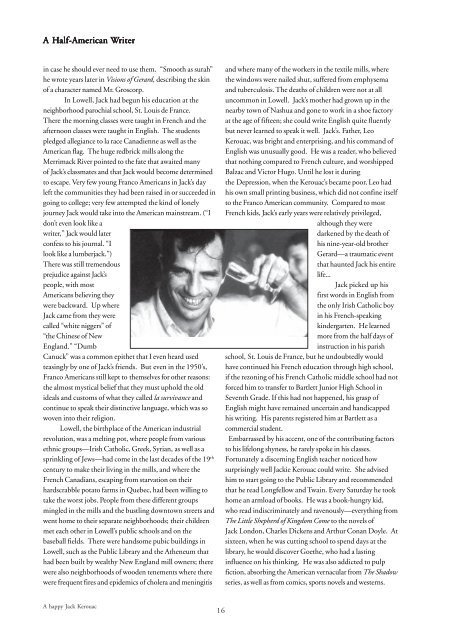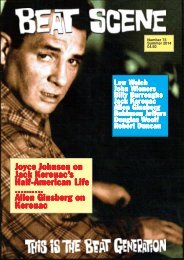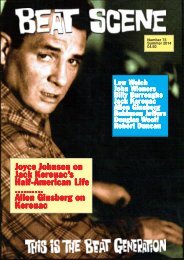You also want an ePaper? Increase the reach of your titles
YUMPU automatically turns print PDFs into web optimized ePapers that Google loves.
A Half-American<br />
Writer<br />
in case he should ever need to use them. “Smooth as surah”<br />
he wrote years later in Visions of Gerard, describing the skin<br />
of a character named Mr. Groscorp.<br />
In Lowell, Jack had begun his education at the<br />
neighborhood parochial school, St. Louis de France.<br />
There the morning classes were taught in French and the<br />
afternoon classes were taught in English. The students<br />
pledged allegiance to la race Canadienne as well as the<br />
American flag. The huge redbrick mills along the<br />
Merrimack River pointed to the fate that awaited many<br />
of Jack’s classmates and that Jack would become determined<br />
to escape. Very few young Franco Americans in Jack’s day<br />
left the communities they had been raised in or succeeded in<br />
going to college; very few attempted the kind of lonely<br />
journey Jack would take into the American mainstream. (“I<br />
don’t even look like a<br />
writer,” Jack would later<br />
confess to his journal. “I<br />
look like a lumberjack.”)<br />
There was still tremendous<br />
prejudice against Jack’s<br />
people, with most<br />
Americans believing they<br />
were backward. Up where<br />
Jack came from they were<br />
called “white niggers” of<br />
“the Chinese of New<br />
England.” “Dumb<br />
Canuck” was a common epithet that I even heard used<br />
teasingly by one of Jack’s friends. But even in the 1950’s,<br />
Franco Americans still kept to themselves for other reasons:<br />
the almost mystical belief that they must uphold the old<br />
ideals and customs of what they called la survivance and<br />
continue to speak their distinctive language, which was so<br />
woven into their religion.<br />
Lowell, the birthplace of the American industrial<br />
revolution, was a melting pot, where people from various<br />
ethnic groups—Irish Catholic, Greek, Syrian, as well as a<br />
sprinkling of Jews—had come in the last decades of the 19 th<br />
century to make their living in the mills, and where the<br />
French Canadians, escaping from starvation on their<br />
hardscrabble potato farms in Quebec, had been willing to<br />
take the worst jobs. People from these different groups<br />
mingled in the mills and the bustling downtown streets and<br />
went home to their separate neighborhoods; their children<br />
met each other in Lowell’s public schools and on the<br />
baseball fields. There were handsome pubic buildings in<br />
Lowell, such as the Public Library and the Atheneum that<br />
had been built by wealthy New England mill owners; there<br />
were also neighborhoods of wooden tenements where there<br />
were frequent fires and epidemics of cholera and meningitis<br />
and where many of the workers in the textile mills, where<br />
the windows were nailed shut, suffered from emphysema<br />
and tuberculosis. The deaths of children were not at all<br />
uncommon in Lowell. Jack’s mother had grown up in the<br />
nearby town of Nashua and gone to work in a shoe factory<br />
at the age of fifteen; she could write English quite fluently<br />
but never learned to speak it well. Jack’s. Father, Leo<br />
Kerouac, was bright and enterprising, and his command of<br />
English was unusually good. He was a reader, who believed<br />
that nothing compared to French culture, and worshipped<br />
Balzac and Victor Hugo. Until he lost it during<br />
the Depression, when the Kerouac’s became poor, Leo had<br />
his own small printing business, which did not confine itself<br />
to the Franco American community. Compared to most<br />
French kids, Jack’s early years were relatively privileged,<br />
although they were<br />
darkened by the death of<br />
his nine-year-old brother<br />
Gerard—a traumatic event<br />
that haunted Jack his entire<br />
life...<br />
Jack picked up his<br />
first words in English from<br />
the only Irish Catholic boy<br />
in his French-speaking<br />
kindergarten. He learned<br />
more from the half days of<br />
instruction in his parish<br />
school, St. Louis de France, but he undoubtedly would<br />
have continued his French education through high school,<br />
if the rezoning of his French Catholic middle school had not<br />
forced him to transfer to Bartlett Junior High School in<br />
Seventh Grade. If this had not happened, his grasp of<br />
English might have remained uncertain and handicapped<br />
his writing. His parents registered him at Bartlett as a<br />
commercial student.<br />
Embarrassed by his accent, one of the contributing factors<br />
to his lifelong shyness, he rarely spoke in his classes.<br />
Fortunately a discerning English teacher noticed how<br />
surprisingly well Jackie Kerouac could write. She advised<br />
him to start going to the Public Library and recommended<br />
that he read Longfellow and Twain. Every Saturday he took<br />
home an armload of books. He was a book-hungry kid,<br />
who read indiscriminately and ravenously—everything from<br />
The Little Shepherd of Kingdom Come to the novels of<br />
Jack London, Charles Dickens and Arthur Conan Doyle. At<br />
sixteen, when he was cutting school to spend days at the<br />
library, he would discover Goethe, who had a lasting<br />
influence on his thinking. He was also addicted to pulp<br />
fiction, absorbing the American vernacular from The Shadow<br />
series, as well as from comics, sports novels and westerns.<br />
A happy Jack Kerouac<br />
16





